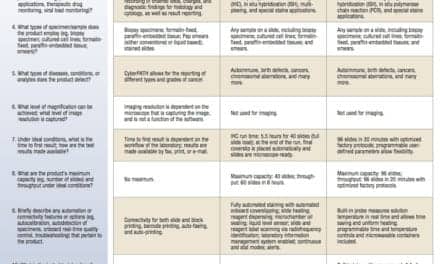Thermo Fisher Scientific, Carlsbad, Calif, has introduced its new EVOS M7000 digital microscope, designed to meet the increasingly demanding applications of cutting-edge biological research. It offers a fully automated, precision fluorescence microscope system with an ultrafast acquisition engine and a user interface developed by biologists for biologists. Features such as a high-end camera and more powerful computer deliver enhanced images enabling users to better diagnose disease, or to analyze the effects of drugs on tumor cells.
“Every day, our customers are generating almost countless gigabytes of data looking at cells to monitor their health, collect images, and report to stakeholders,” says Dara Grantham Wright, vice president and general manager for protein and cell analysis at Thermo Fisher Scientific. “The EVOS M7000 microscope is designed to give biological researchers a more powerful platform with the speed and image quality they need to gather data faster and move science forward.”
Building on the strengths of its predecessors, the EVOS FL Auto and FL Auto 2 cell imaging systems, the EVOS M7000 has an upgraded XE3 computer and a Quadro graphics card to significantly reduce time acquiring and saving images. On a 50 x 50 scan with the monochrome camera, the EVOS M7000 microscope reduces average image acquiring time by 19 minutes and average saving time by 15.9 minutes when compared to the FL Auto 2. On a 1000-image scan with the color camera, it decreases average acquiring time by 7.76 minutes and average saving time by 21.5 minutes.
Equipped with color and monochrome cameras, the EVOS M7000 microscope features automation routines for multiwell plate scanning and image tile stitching with autofocus, Z-stacking, and time lapse that can be set up with just a few clicks of a button. Higher sensitivity also allows for reduced light exposure for weakly stained samples and phototoxicity and photobleach reduction. Combined, these features offer exceptional usability across a wide range of cell models, vessels, and assays.
For further information, visit Thermo Fisher Scientific.
Featured image: The EVOS M7000 digital microscope from Thermo Fisher Scientific.





